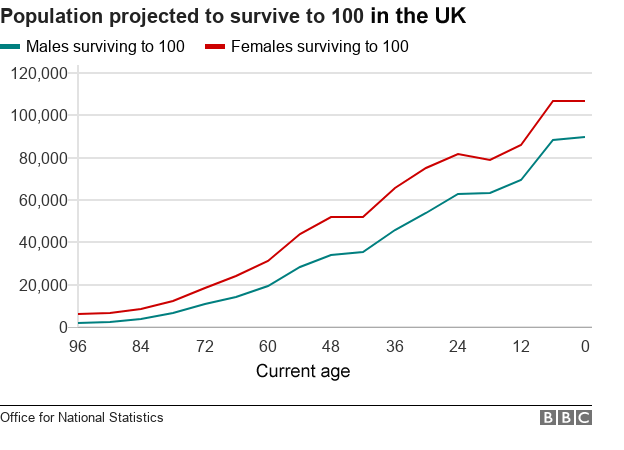What are the secrets of the superagers?
- Published
Watch the 84-year-old record-breaking athlete in action
What will you be like in your 80s? Living independently, robust in body and mind, with a wide social circle?
Manage that and you will be a superager. It is a worthy aspiration, but the reality is rather different for most of us.
Although we are living longer, more of those extra years are being spent in ill health,, external often with multiple chronic conditions.
Of the 65 million people in the UK, 8.45 million are projected to live to 100, according to analysis from the Office for National Statistics.
That's around one in eight of the population and a timely reminder that many of us will spend a third of our lives in old age.
Ageing is a global issue - the number of people aged 65 and older is projected to almost triple to 1.5 billion by 2050., external
California is one of the key centres for ageing research - and it's where I met both scientists and superagers.
World population day in numbers
Let's start with Irene Obera.
She's 84 and the fastest woman on earth for her age. Irene has been breaking world records in Masters athletics for four decades.

She has the poise and physique of someone in their prime and makes age look like an irrelevance.
Her philosophy is simple: "A quitter never wins, and a winner never quits - and I want to be a winner."
Being a winner involves grit, determination and relentless effort.
I met Irene and her coach Alan Kolling at Chabot College, near San Francisco, where they train three or four times a week.
Then there are the gym sessions, tennis and bowling - Irene is on the go all day.
"You gotta use it, or you lose it," she says with a smile.
Her only period of ill-health was self inflicted - when she dropped a weight on her toe in the gym.
As with all the superagers I've met, Irene retains a positive attitude - her horizons have not narrowed as she has aged.
She is socially connected; as well as all the people she meets through sport, Irene volunteers in her local community.
Ageing well is about exercising the mind as well as the body.
It's thought that one in three cases of dementia could be prevented if more people looked after their brain health throughout life.
You might also like:
I joined a French literature class at the Alliance Française in Berkeley, across the bay from San Francisco.
All the students were in their 70s, and retained the same curiosity and positive attitude which seem to be hallmarks of superagers.
Pamela Blair, 76, a retired psychologist, told me: "I love the French language and its literature. But I'm also here to exercise my mind - my mother had Alzheimer's".

The Buck Institute for Research on Aging
The idea that ageing itself can be targeted is gaining momentum, in part as a result of the work of scientists at the Buck Institute for Research On Aging., external
Clad in white Italian marble, with the same architect as the Louvre pyramid, the institute sits in the hills above Silicon Valley.
It has nearly 300 scientists, spread across 18 laboratories, who investigate the connection between ageing and chronic disease.
What is it that cancer, heart disease, stroke, dementia and osteoarthritis all have in common? The fact that your chances of getting any of them increase as you age.
Prof Judy Campisi, one of the lead scientists at the Buck, told me: "It's not a coincidence that all these diseases occur at the same time - we think there are basic ageing processes that cause all of them."
Like others at the Buck Institute, Prof Campisi is convinced that science will be able to help us age more healthily.
She said: "We predict there will be drugs that will treat ageing, and as a consequence we will be able to extend healthspan, the years of healthy life.
"This would mean people could look forward to the last decade of life being vibrant and engaged - their brains and bodies working optimally."
As part of this series of reports on superagers I'll be looking at two drugs which some scientists believe could target the ageing process.
Follow Fergus on Twitter., external